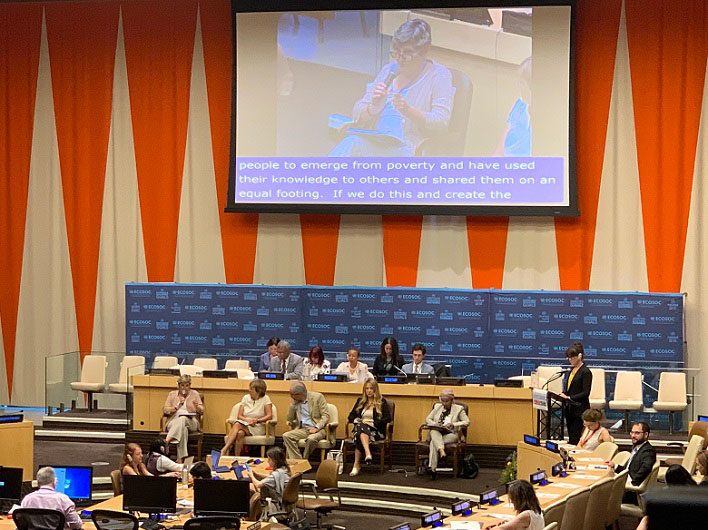Experience of People in Poverty: Critical to SDGs Success


After the 2019 High-level Political Forum on the Sustainable Development Goals (SDGs), ATD Director General Isabelle Pypaert-Perrin spoke to UN Member States, UN agencies and NGOs at the ECOSOC High Level Segment. The July 19 meeting addressed long-term trends and scenarios for “Empowering people and ensuring inclusiveness and equality”.
The Secretary-General reminds us in his reports that achieving the SDGs requires the participation of all stakeholders in policy development, implementation and evaluation. This requires participation in knowledge production to imagine innovative policies.
If we want inclusive development which leaves no one behind, we need inclusive knowledge.
We are still far from that. Most of the time we continue to develop knowledge about people living in poverty, but not with them. We propose solutions that we have imagined for them, but without them.
That is, we continue to ignore, or even deny, the unique knowledge that people living in extreme poverty have built up through their life experiences.
This knowledge is needed to achieve the SDGs. It is people living in poverty who can help us understand why and how some are left behind and even pushed down. They can teach us how to build more inclusive and sustainable societies.
In ATD Fourth World, we have seen how people living in poverty can have an equal role in developing knowledge. But we must actively seek them out and create conditions that enable them to express their thoughts freely.
ATD Fourth World and Oxford University recently conducted participatory research that brought together people living in poverty, academics and actors in the field. Participants came from Bangladesh, Bolivia, the United States, France, the United Kingdom and Tanzania. The SDGs focus on eradicating poverty in all its forms and dimensions. So what are its dimensions? Together, we sought to shed new light on poverty’s defining elements.
Through a unique participatory approach, the research combined the knowledge of people living in poverty, academics, and actors in the field. We identified new aspects of poverty beyond the more traditional dimensions of deprivation. For example, social and institutional abuse. When research participants talked about living in poverty they described suffering and struggle, but also a constant phenomenon of disempowerment. You are always working hard for yourself, your children, and your neighbours to get out of poverty. But you are also continually belittled, crushed.
I was recently with a group of people whose lives are very difficult and who called themselves “the families in solidarity”. They encourage each other and have developed solidarity with those who are living in the most critical situations. For example, they are attentive to people at risk of dying because they lack care or mothers who have no money to send their children to school.
Mrs Louise was telling me how she does this. To support her family, she goes to the market and gets hired to carry huge shopping bags on her back. Sometimes a neighbour asks her for help. Because Mrs Louise has nothing herself, she says to her neighbour, “Come with me”, and she shares her work and earnings with this neighbour. Despite their sometimes pitiful means, these families are building the foundations of a social protection base for all, something which is still lacking in so many places.
But I keep in mind the question Mrs Louise asked me:
“We are making huge efforts. We are struggling so hard to make poverty disappear. Will our children reap the benefits of our struggle or will they die in the same poverty as us?”
Mrs Louise pinpoints a fundamental injustice. The poorest people make enormous efforts to reduce poverty. But their resistance does not produce the changes they are hoping for as long as they remain alone in their struggle.
We often talk about empowering people. But do we realize that this must mean rooting our efforts, policies and projects in what people living in poverty are already doing? If we can figure out how to scale up their own actions and make them more effective, we will finally be able to eradicate extreme poverty.
More information on the High Level Segment and photos.
Summary of panel including Isabelle Pypaert-Perrin (in bold ideas she introduced):
In the session on long-term trends and scenarios, participants drew attention to decision-making and SDG implementation at a time of uncertainty regarding solutions such as the benefits or potential dangers of new technologies. Panelists discussed the key role of equality in achieving the other Goals; the multi-dimensional nature of inequality; the role of diverging demographic trends in driving inequalities; the vicious cycle created by long entrenched inequalities and denial of human rights; the importance of transparency, predictability, and accountability, especially in national budgets; access to technology and capacity for all countries and citizens; the potential of climate change to exacerbate inequalities, and the need for just transitions; and the need for all voices to be heard while drafting policies.

